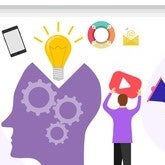There is so much to make us mad. The people who are trying to get us to spend more time on-line consuming their content know it. News stories drip with disbelief and outrage. To skim through the headlines of even a non-partisan newspaper these days is to subject yourself to a heartrate workout.
The free access to information is, of course, to blame. Why should this be so you ask? Back in the 1950s, the political scientist Herbert Simon noted that information consumes its recipients' attention. As such, "a wealth of information creates a poverty of attention, and a need to allocate that attention efficiently among the overabundance of information sources that might consume it."
In other words, because we have so much content potentially available to us at any moment, creators employ ever more fantastic methods to get us to stop on their story.
Long-term success as a senior manager requires you to keep your cool in many settings, including the two I’ll discuss today: handling information overload and remaining calm when others have lost their cool. Let's consider both points.
Information overload
Even if you become reliably good at detecting misinformation, you still face an overwhelming amount of legitimate information relevant to your business. Which regulations are the ones you need to focus on with high priority, and which can you put lower down on the list?
There are hundreds of thousands of laws, rules, and regulations that apply to businesses in every country. If you are working in a multinational context, the number of applicable rules runs to the millions. Authorities themselves enforce these rules selectively in the sense that they give greater attention to certain topics at different times.

Authorities' priorities are driven by politics, public perception, and the gamut of emotional responses that characterize human behavior generally. Companies make convenient scapegoats for politicians looking to distract from their own poor performance. We are also seeing more countries using targeted enforcement against non-local companies for purposes of geopolitical positioning. The European Union's antitrust enforcement, or individual member country's digital service taxes, are recent examples.
Amidst all this, you are bombarded with law firm and consultant advertising. Each firm tells you the issue they're hawking is the most important in the world, and that you must immediately drop everything or face humiliation and ruin. See Career Path: How to Implement a Project with Lackluster Management Support.
So how to choose among many competing possible priorities? Guess correctly, and you will help your company safely navigate the complex minefield of public expectations and compliance. Wrongly deprioritize even one significant topic, however, and you be held responsible for not "setting the right tone" and instead contributing to a culture of non-compliance. The stakes are high, in other words, when you choose where to focus your limited attention.
Remain calm
Keep your cool. Take fear, and emotion, and excitement out of your decision-making if you can. Hone your BS-detector so that you can more easily tell when someone is selling you something that is unambiguously good for them, and only potentially good for you.
Take fear, and emotion, and excitement out of your decision-making if you can.
Collect reliable indicators to separate fevered headlines from real-world changes. Are companies in your industry taking up the topic? Have any peer companies found themselves in trouble? Do enforcement authorities have any teeth, and have they shown themselves willing to combat companies?
I read widely and considered multiple sources for every potential new issue. I wanted to see people with different perspectives and different agendas talking about it. Over time, I learned which publications, and which authors within them, had a better track record of focusing on relevant topics. Your systems for detecting significance among much noise will vary, but you must develop and test them if you want to be more than just lucky in your career.
Your systems for detecting significance among much noise will vary, but you must develop and test them if you want to be more than just lucky in your career.
On to our final point, which is easy to describe: No one welcomes a panicky lawyer to their party. In a crisis, a person who keeps their cool helps the whole team stay focused. True, you are operating under the same uncertainty, and you are feeling the same twisted gut, as the others. But you focus on what can be done, and on what the company needs to do next.
I suggest keeping calm amidst bedlam is also one of the easiest things for you to do. It's easy when you remember that you are simply playing a role, among the many roles you already play. Your role in a crisis is to be the level head, the sage counsel, the unflappable member of the team. Act that way, and you will not only start to feel that way, but others will believe you are that way.
And a person who keeps their cool when others are losing theirs is seriously cool. Try it and see if you don't agree with me.
Be well.




